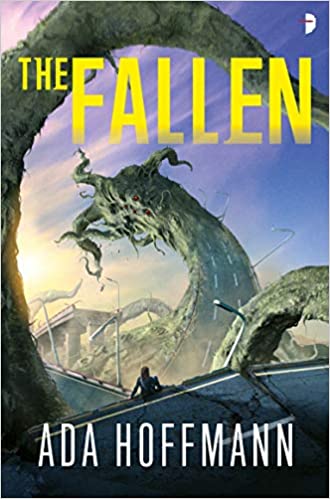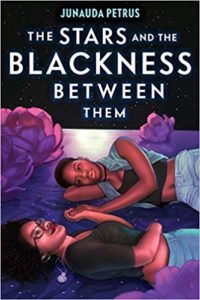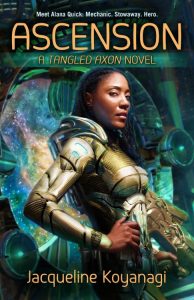Remember last month, when I said that I love the publisher Angry Robot and the book that made me fall in love with them was Ada Hoffman’s The Outside? Well, manifesting works, because this month, I get to review The Fallen, The Outside’s sequel. This review will include some spoilers for The Outside, so I recommend reading that before reading this review!
The novel picks up where the last book left off, with Yasira recovering from her trip to the Outside while her girlfriend, Tiv, takes care of her and leads the rebellion against the Gods. We also see the return of the vengeful AI Gods and their legion of warriors, out for revenge against Yasira. I don’t want to include spoilers for the plot, so I will just say that another space opera adventure ensues. I loved returning to the world of the Chaos Zone because of the truly unique worldbuilding. The combination of spirituality and artificial intelligence is such a fascinating premise. It makes the more technology-focused parts of the novel still interesting to read about. In this novel, we see the angels struggle with balancing their emotions, their roles in the divine system, and their technological nature. We also see the toll taken on the resistance fighters, and their desire to press on despite it all. This story is engaging and fast-paced.
The only part of the novel that I didn’t love as much were the constant time skips. It was interesting to see the characters at different points in the narrative, but, especially combined with all of the new information presented about the world, it did feel overwhelming to me at times. I could still easily follow the story, it just felt a bit all over the place. Despite that, I really liked the interludes between chapters, where we get to see the diary of Yasira’s old mentor Evianna Talirr. These streams of consciousness really underpin the themes of the novel and breaks up the story nicely.
Once again, just like in The Outside, we see representation of autism and mental illness. As a neurodivergent person myself, I love seeing this experience valued and centered in a science fiction story. Neurodiversity is explored not just in Yasira, but in different cultures throughout the world, which was amazing to see. Moreover, I love that there are emotional consequences to the events that happen in this world. Yasira is truly changed and impacted by the scary, traumatizing things she’s seen and been through, both mentally and physically. Tiv is also impacted by the things she’s seen, and carries the weight of the primary caretaker role in the relationship. This is all while the couple is still in danger, facing the ire of some of the most powerful beings in their universe. In general, I am always impressed by the exploration of mental and emotional health in this series.
Another part of the book I really liked was learning more about what happened to Old Earth, our world, in this series’ universe. There is a scene where Tiv visits a museum detailing everything that happened on Earth, focused mostly on the people’s suffering. This part felt very prescient and also made me truly understand why people in this universe relied so heavily on the Gods despite their destructive, controlling natures. It built upon the worldbuilding of the last book in a detailed way. The Fallen is another adventurous foray into the technotheocratic world that Ada Hoffmann has created. It definitely lives up to its predecessor and represents characters that are usually not included in science fiction, much less space opera. This book was released on July 13th, so you can pick up a copy now. Thank you to Angry Robot for providing this ARC.



